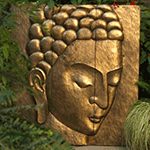There is no foolishness
that a person will not perform
if they are not committed to Truth
and give no thought
to the consequence of their actions.
Dhammapada Vs 176
Forgive me ….
A word often used with good intention in Dhamma teachings, is forgiveness, with the sentiment that we should at all times be generous and forgive others.
However, in true Dhamma understanding this is not a correct view simply because there is no concept of forgiveness.
We have to understand that in order to forgive another we must take the moral high ground. We must stand above in judgement so that we can say, ‘I forgive you’.
In order to forgive another we must place ourselves in a morally superior position, if not, how can we forgive?
The Dhamma understanding, established in the attitude of love and kindness, is different and extremely simple; as long as beings are unenlightened they are capable of any kind of cruel and unjust action through their body and speech. With this true understanding, there is nothing to forgive, only the reality of unawakened behavior to accept.
Do you understand?
We don’t forgive the dog for barking at two o’clock in the morning, we accept it as behavior of the dog. We don’t forgive our children for painting on the walls of their bedroom, we accept it as the behavior of children.
And so, when beings act cruelly to others, when they hurt and kill other living beings, when they justify their racism, sexism or ageism, when they behave in unenlightened ways, we accept the reality of the situation.
With love we accept and with wisdom and kindness we respond.
Response is an important part of living in and being part of the world. It is only which kind of response we use that will determine our deepest Dhamma understanding. More anger, more violence, more hatred will not bring peace to you or the world and it is here we need to be clear that our dhamma life must be more than something we adhere to when things go well for us.
With true Dhammic understanding we live peacefully with all the things that we don’t like without trying to destroy them or worse, judge them and then forgive them for their perceived imperfections.
May all beings be happy.
*******
Koan:
Master Joshu was sweeping the monastery grounds when a layman approached and said, “You are a great Dhamma master, but where does this dirt come from?
“It comes from outside,” was the reply
“But this is a pure monastery, how can the dirt come in?”
“Here is more.” replied the Master.
Quotation:
Meditation is the key to self purity and to liberation. There is no difference between the two. Once we have removed greed, hatred and delusion from the mind, we are already free. We don’t have to wait until we are dead. We can do it now.
From: Higher Than Happiness by Michael Kewley
*******
Follow Michael on facebook
Next Pure Dhamma Newsletter, January 2024
To unsubscribe from the newsletter,
please send an e-mail to dhammateacher

